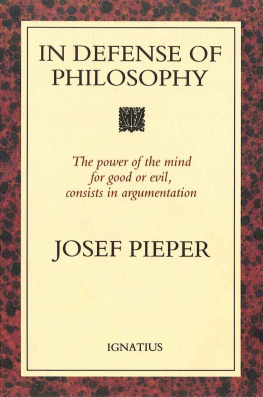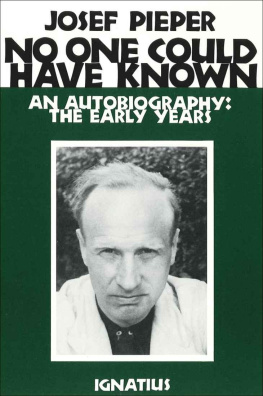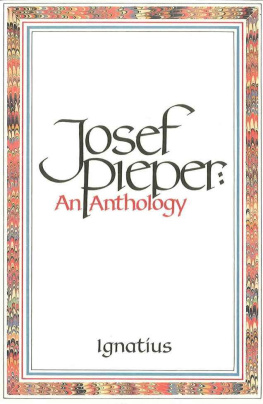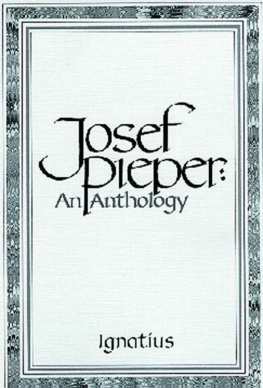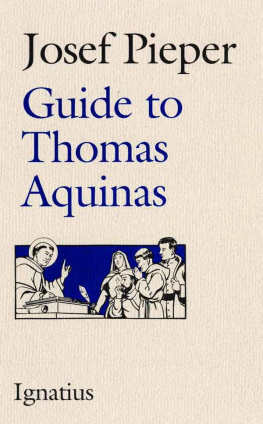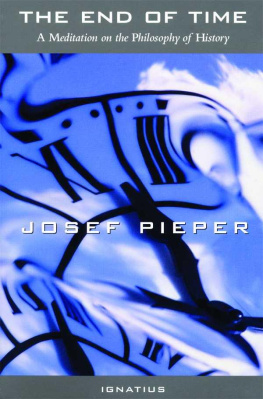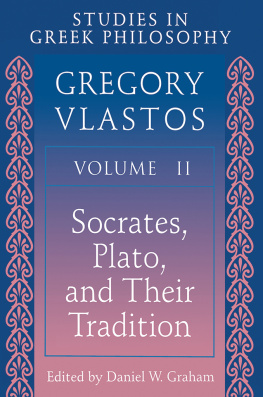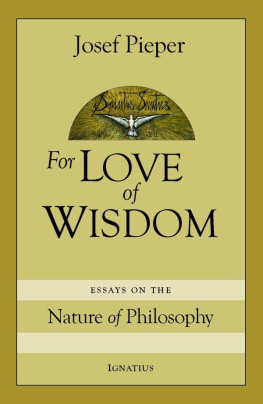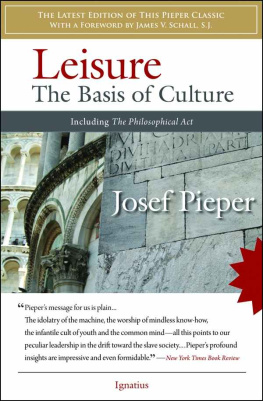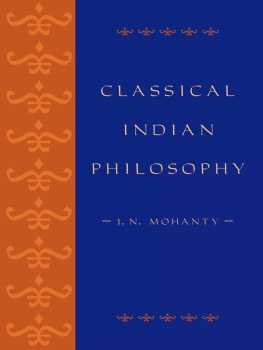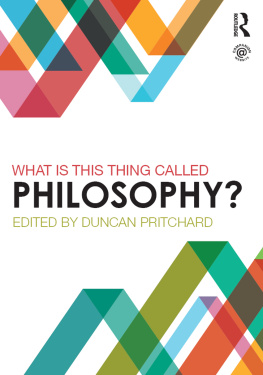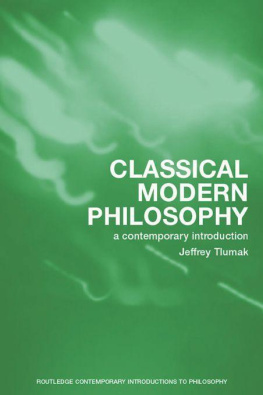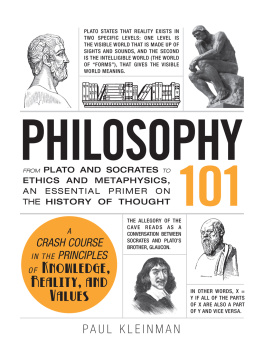IN DEFENSE OF PHILOSOPHY
JOSEF PIEPER
IN DEFENSE OF PHILOSOPHY
Classical Wisdom
Stands up to Modern Challenges
Translated by Lothar Krauth
IGNATIUS PRESS SAN FRANCISCO
Title of the German original:
Verteidigrungsrede fr die Philosophie.
1966 Ksel-Verlag GmbH & Co., Munich
Cover design by Roxanne Mei Lum
1992 Ignatius Press, San Francisco
All rights reserved
ISBN 978-0-9870-397-9 (PB)
ISBN 978-1-68149-255-1 (E)
Library of Congress catalogue number 91-76072
CONTENTS
A topic by nature controversial. The first objection: Is the philosophical question answered at all? Second: the problem inherent in philosophys subject matter: What does it mean to encounter something? Can we discuss the incomprehensible? Third: the sciences and reality as such. Fourth: What good is anything not serving a purpose?
The philosophical aspect. Philosophy is not an ordinary activity. Catharsis through the experience of death and Eros. Philosophy and praxis are incommensurable. The attempt to eliminate the discrepancy makes sense. Brentanos consoling observation
Art and religion are philosophys neighbors. Illusions and deceptions; religion and magic; art and entertainment. Why party activists are harmless, sophists dangerous. The interest of the day and the vanity of opinions (Hegel)
The totalitarianism of the world of production rejected. The meaning of philosophy alone is free (Aristotle). Freedom and knowledge as such. Freedom and the search for truth. In what sense is philosophy uniquely theory? The scientist does not keep silence but asks questions. The gold of philosophical silence contained in the silver of the scientific discourse. The simplicity of philosophy is more demanding than scientific objectivity. To be critical in a philosophical way. To use and to enjoy (Augustine). Philosophy, meditation, loving contemplation
What does meaningful in itself mean? Good for something in the context of personal existence. Difficulties with the arguments. What cognition achieves in the context of existence: satiated by being . To see or to perish (Teilhard de Chardin). What do those not see... Philosophical theoria and the visio beatifica . Reality as such and the nature of the spirit. Existence face-to-face with all that is. What is this: something real? (Aristotle). To conceive a complete fact (Whitehead)
None of the gods philosophizes (Plato). Philosophy as non-wisdom. Philosophys object cannot be known. Knowledge and understanding. The reality of a thing is also its inner light (Thomas Aquinas). Reality as lucidity can be known. Differences with regard to Marxism. The world can be known, and yet remains unfathomable: both because it is creation. Rejection of agnostic resignation and rationalistic arrogance
Philosophy as embarrassment for all (Jaspers). Scientific philosophy. A list of complaints. The infinite journey of philosophy and of existence itself. Can we achieve complete understanding? Completeness is a phantom (Whitehead). Insight and wisdom seem equally dispensable. (Eliot). Science as discovery, philosophy as remembrance. The convergence of the scientific and the philosophical quest
Facing the challenge. The language of philosophy and the clarity of expression. Misuse of language on the part of certain philosophers. Philosophy and poetry. Clarity and precision. Language and terminology. To wonder at reality as expressed in protocol sentences. Relationship to experience. Legitimacy based on empirical roots. Leaving aside nothing
To include super-rational notions. Not one philosophy, rather philosophizing individuals. Revelation, tradition, faith, theology. The problem with a philosophy devoid of any presupposition. Sartres faith. Academic sophistry is irrelevant. Can a Christian philosopher disregard the tenets of his faith? Two voices: a believer cannot be a philosopher (Heidegger); the philosopher cannot have faith (Jaspers). Philosophy as absolute questioning, philosophy as absolute freedom: both in contrast to the traditional notion from Plato to Kant. The correlation between what is known and what is believed in philosophy defies precise description. Polyphone chords as analogy. Seeing and hearing. Conflicts to be expected. The decisive point: a conscious openness to the totality of all that is
Many indispensable and important things,
such as justice,
are in themselves unprotected.
They have to be defended by those in power,
who in doing so
not only fulfill their duty
but also find their own justification.
The power of the mind, however,
for good or evil,
consists in argumentation .
I
Concerning the method used in the following reflections, I have followed to some extent the common approach employed for several centuries by the universities of medieval Christendom. As can be seen in any articulus of the great Summae , their structure would first pose, in as precise a formulation as possible, a question for discussion, together with a proposed answer, or at least with a hint of a possible answer. But then the one posing the question would keep silent for the time being, turning himself into a listener to learn the positions and objections of his opponents. More precisely, he himself, the questioner, would quote these opposing voices in the most concise and persuasive manner. Really a very demanding and difficult but also extremely convincing approach. For there would not remain any doubt that the subject matter in question could be seen from different angles, and therefore was by nature controversialby nature: not only because the matter itself presented different objective aspects, but also because of the specific approach on the part of each searcher for knowledge, each questioning subject, who should not at all be understood as an individual, as one person, but as the many, and even more accurately, as all mankind. The methodology itself, therefore, brought home forcefully that the search for truth is a common human endeavor, taking place by its very nature in dialogue and discussion, also in controversy, and possibly perhaps in a controversy that could never be resolved, that would never arrive at some definitive and satisfying answersuch as would happen when dealing with a specifically philosophical topic.
Our topicor to spell it out right away, our thesisreads as follows: to engage in philosophy means to reflect on the totality of things we encounter, in view of their ultimate reasons; and philosophy, thus understood, is a meaningful, even necessary endeavor, with which man, the spiritual being, cannot dispense .
Two things are thus asserted here, and so objections might be expected to aim at these two different aspects as well. For one, this definition of philosophy proposed here could be declared wrong; or else, it could be maintained that to engage in philosophy as described here would be, if not meaningless, at least pointless.
But first we should explain more specifically what our thesis implies. At first sight, it may appear somewhat general, perhaps even quite vague and much too innocuous. As regards generalwell, it is supposed to be such, this is the intention. That it is not vague will become clear as we proceed. And far from being innocuous, it would be considered an act of sabotage, and rightly so, if we were to proclaim it only a few hundred kilometers to the east of here [in Communist Eastern Europe]. The meaning of our thesis all but coincides with a statement made by Alfred North Whitehead during a public symposium at Harvard University on the occasion of his seventy-fifth birthday, a statement that certainly was spontaneous but hardly unreflected, namely, that philosophy consists in the simple question, What is it all about? Whatever else, his description of philosophy should be seen as reflecting the realistic, unimpassioned attitude of the researcher and scientist who is allergic to all verbal haziness.
Next page
